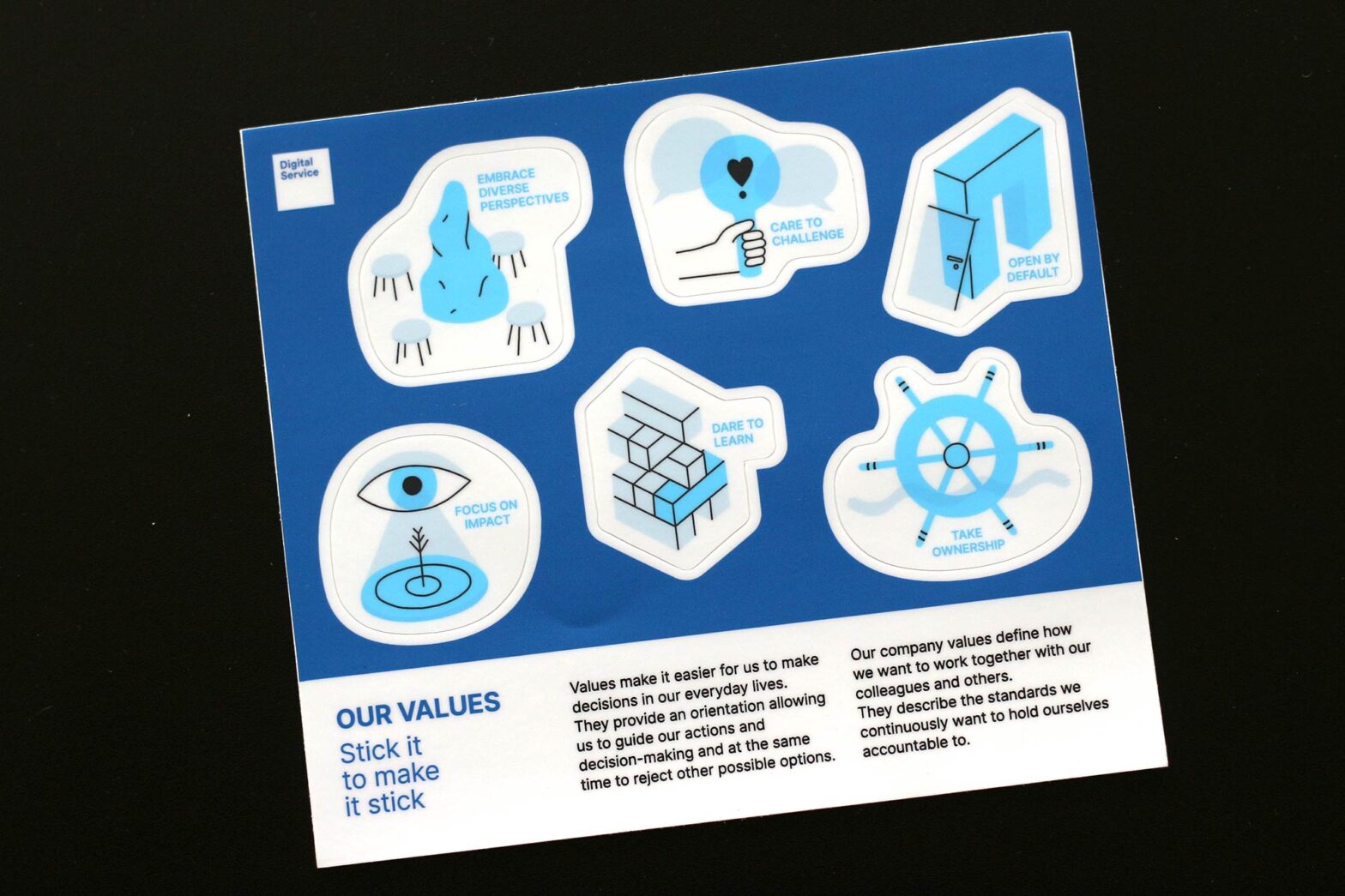Several weeks in the making, our organisational values are now available as a sticker sheet. My colleague Daphne went back and forth with me and Fabian and Sonja, the 2 colleagues in the lead for the work. To get to these, Daphne made several sketches for each of the 6 values. We tested them, incorporated the feedback and have them in various formats: physical stickers, virtual stickers for Google Slides and Miro, and Slack emojis. Daphne had to strip them of details and boil them down further to work in the smallest size. She is still working on more detailed versions of the illustrations for an office poster.
Colleagues embraced the stickers immediately. Especially the Slack mini version gained instant popularity. The values are mentioned on the career page, are evaluated in interviews and are considered in the upcoming autumn feedback cycle, too.
Next up is a large A1 or A0 poster for our office space. Daphne is just finishing those. They come with short explanations of what’s behind each value.
These values change some conversations and give certain activities a more stable ground. The weeknotes I write every week or so are linked to our value ‘Open by default’. And me asking critical questions about the status quo of German government is rooted in the value ‘Care to challenge’.
Iterating our Service Standard reporting template
Given a related objective for the quarter, I’m not standing still on Service Standard-related things. I moved some small but useful things along this week.
When we published our first 2 self-reports about a month ago, I was not satisfied with how some information was shown there, but it was more important to get them out. Better done than perfect.
We made sketches of how especially the overview information on how well each of the 19 points is met is displayed. Supported by external developers, Daphne, David, and I got our desired design improvements implemented. The reports for both services have been updated.
After reviewing the templates used by our Australian and British colleagues, we took what we saw and pushed it further to suit our needs. As the German Service Standard has 6 sections, we structured the template accordingly. The status of each point is indicated through a colour-coded label. Clicking any points leads to the related details with a short bullet-pointed overview and further explanation.
Initially, I wanted us to publish the reports on Servicehandbuch.de, the German government’s Service Manual. But as it’s somewhat dormant and currently not maintained, it’s more practical to put them out on our own website. There, we are in control.
Having the published reports, I spoke to a colleague at the German National Regulatory Control Council (NKR) last week. The NKR set up the manual about 2 years ago. They were delighted to see us making progress on Service Standard implementation but can offer only little support. The NKR is the strongest proponent of broad and deep adoption of the Service Standard. Through multiple statements – in early February and late May – they urged policymakers to have digital teams embrace the Service Standard by default.
Instead of waiting for that to happen, Caro and I ran another Service Standard workshop with a team working on a digital justice service. The team has it referenced in its contract and wants to work against it. We have some good workshop routines by now and should be able to package up and share our workshop resources with other people later this summer.
For August, we plan to move our self-assessments to friendly internal peer reviews. That would be the first time teams at Digital Service are no longer marking their own work. Instead, colleagues from other parts of the organisation will help them do the assessment and make recommendations. We suppose this leads to better outcomes and grows cross-organisational understanding of how to meet the Service Standard. It also relates to the value ‘Embrace diverse perspectives’.
Doing peer reviews follows good practices from other countries and particularly considers advice from UK local government, where I spoke with Philippa some months ago. She co-ran peer reviews in Hackney Council and other local governments and shared various perceptions and fears related to assessments. In the coming weeks, Caro and I will write guides for everyone involved in the peer reviews.
What’s next
Next week is a shorter week for me. With the other heads of discipline out, I will cover some of their tasks and hope to make progress on some shared objectives.

